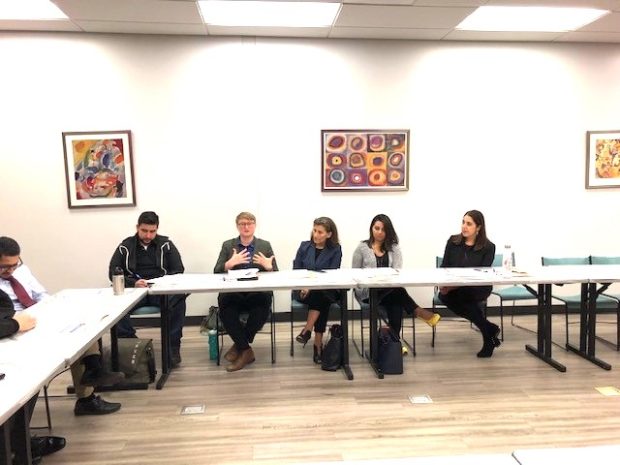Clarifying Trump’s move to bar immigrants deemed a ‘Public Charge’

Bay Area Legal Aid lawyer Lisa Newstrom (second from left) explains the policy changes to Public Charge as Employment Services Director at Santa Clara County Rafaela Perez (third from left) and Assistant to San Jose City Manager Zulma Maciel look on. INQUIRER/Harvey Barkin
SAN JOSE, California – To clear up public notions of the Trump administration proposal to deny legal status to immigrants considered a “Public Charge,” the Santa Clara County Office of Immigrant Relations and the San Jose Office of Immigrant Affairs hosted a media roundtable last Nov. 16.
In immigration law, Public Charge refers to a person likely to become primarily dependent on the government to meet basic needs.
The panelists demystified legal complications and quelled some fears as a consequence of President Donald Trump’s proposed Public Charge policy changes restricting access to legalization for immigrants who have used some forms of public assistance.
Bay Area Managing Attorney Lisa Newstrom made it clear that the proposed changes in Public Charge may affect some immigrants seeking entry into the U.S. from abroad and some who are within the U.S. on temporary visas and applying for green cards.
It does not affect US citizens, but it may affect legal permanent residents (LPR or green card holders) if they return to the U.S. after staying out of the country for more than 180 days (6 months). Also, LPRs applying for U.S. citizenship are not subject to Public Charge tests.
Who would be affected
But the proposed changes would not apply to: refugees, asylees, those in the Violence Against Women Act (VAWA) program, special immigrant juveniles and survivors of trafficking, domestic violence or other serious crimes.
Currently, the benefits considered Public Charge are: Supplemental Nutritional Assistance Program or SNAP/CalWORKs, Supplemental Security Income (SSI), General Assistance (GA) and long-term institutionalization at government expense.
The proposal seeks to expand the types of public assistance program to determine if the immigrant could become a Public Charge. These would include all of the aforementioned plus: health coverage through Medi-Cal (but not emergency Medi-Cal), CalFresh (food stamps), low income subsidy for prescription drug costs under Medicare Part D and rental assistance under Section 8 housing vouchers, Project Based Section 8 and Public Housing.
The proposal puts the period of benefits used for determination in the past 36 months. A determination could also be made if the individual is likely to use or receive benefits in the future. The Public Charge policy changes take effect 60 days after it becomes law.
Other factors used in determining a Public Charge include age, income (listed in the proposal as having an income of at least 250 percent of the Federal Poverty Line or about $63,000 for a family of four in 2017), education and family status. Newstrom said, the immigrant sponsor’s affidavit of support will also matter.
Public comments needed
The proposed rule was announced by the Trump administration last October 10. Public comments on the proposed rule can be submitted by visiting the Federal Registerat the National Archivesuntil December 10, 2018. It could take the Federal government several months to issue a final rule after considering the comments.
But the impact in places like San Jose, the capital of Silicon Valley, is deeply felt. San Jose is part of Santa Clara County and home to one of the largest immigrant populations in the US. An estimated 38 percent of County residents are foreign-born and over 60 percent of children in the County have at least one foreign-born parent. Almost 47 percent employed in the County are immigrants. About 42 percent are business owners and two thirds work in the information and computer technology sectors.
Immigrants founded half of the high-tech start-ups in Silicon Valley. And immigrants or their children founded half of the 14 Fortune 500 companies based in Santa Clara County. In 2014, the New American Economy analysis found immigrants contributed about $77 billion to the County’s economy.
The Migration Policy Institute (MPI) analysis found that 35 percent of non-citizens in Santa Clara County live in families that use at least one of the four benefits that could be considered in Public Charge determination – up from two percent.
Kids most vulnerable
MPI found that both US-born and immigrants mostly use SNAP and Medicaid/Children’s Health Insurance Program or CHIP. MPI also reported that the must vulnerable to the policy change would be the children.
Newstrom said in a case of a US-born child with an undocumented parent, public aid for the child is still available and Federal and State laws specifically forbid data sharing. But MPI reports that according to the March 2018 Draft Rule, benefits used considered include “individual applicants and any dependents including anyone the individual is legally required to support.”
According to the County’s executive Asian Pacific Islander (API) summary last year, of its estimated 632,262 API residents, 91,414 are Filipino. At least 71 percent of them are naturalized US citizens.
And according to the Census Bureau’s 2011-2015 community survey, 34 percent of Filipinos reported an annual household income of less than $75,000; 33 percent, $75,000 to $150,000 and 28 percent, $150,000 or more.
But even in an affluent county like Santa Clara, Catholic Charities and other county agencies report that there have been fewer and fewer people who avail of public assistance after proposed changes in Public Charge were announced.
Some non-profit organizations (not Federally funded) also say that they now have fewer people seeking assistance. Even free workshops for citizenship applicants are getting low numbers, said Assistant to the San Jose City Manager Zulma Maciel.
Policies may change. The law is complicated enough that the only way to make sure is to consult an immigration lawyer for specific cases. Public comment is still the best way to challenge this proposal before it becomes law.

